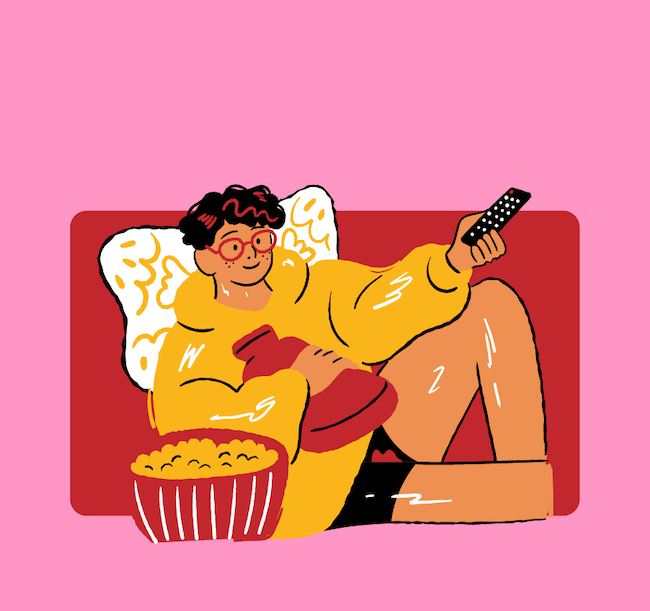PERIOD WEEK: A Self-Care Guide For That Time of the Month

Our bodies endure a lot. And, it definitely deserves a pat on the back for doing hard things that sometimes you don’t even notice. If you’re someone who gets their period, it remains important to remember to go easy on yourself. Your hormones control your emotions, pain erupts in some places, and you feel uncomfortable most of the time.
Generally, most strategies for self-care during your period come from friends, family, and sometimes even medical advice. However, everybody is different. Some relief can work on another person but it doesn’t mean it could work on you. So, get to know your body and listen to it. That way, you can find out what it needs during your period.

The cycle of your period has four phases: the follicular, ovulatory, luteal, and menstrual phases.
FOLLICULAR
The follicular phase starts on the first day of menstruation and ends with ovulation. Prompted by the hypothalamus, the pituitary gland releases follicle-stimulating hormone (FSH). This hormone, then, stimulates the ovary to produce around five to twenty follicles of tiny nodules or cysts which bead on the surface.
Each follicle houses an immature egg. Usually, one follicle matures into an egg. Meanwhile, the others die. Aside from that, the growth of the follicles stimulates the lining of the uterus to thicken in preparation for a possible pregnancy. This can occur around Day 10 of a 28-day cycle. There are, however, people who have longer or shorter cycles than that.
OVULATORY
The release of a mature egg from the surface of the ovary occurs during ovulation which usually happens mid-cycle, around two weeks or so before menstruation starts. During the former phase, the developing follicle causes a rise in the level of estrogen. The hypothalamus in the brain recognizes these rising levels. Then, it releases a chemical called gonadotrophin-releasing hormone (GnRH).
This hormone prompts the pituitary gland to produce raised level of luteinizing hormone (LH) and FSH. Within two days, the high levels of LH trigger ovulation. Waves of small, hair-like projection funnel the egg into the fallopian tube and towards the uterus. Usually, typical eggs only live around 24 hours. Unless it meets a sperm during this time, it will die.
LUTEAL
During the former phase, the egg bursts from its follicle. However, the ruptured follicle stays on the surface of the ovary. For the next couple of weeks, it transforms into a structure called the corpus luteum. This releases progesterone, along with small amounts of estrogen.
Its combination of hormones maintains the thickened lining of the uterus, waiting for a fertilized egg to implant. If a pregnancy does not occur, the corpus luteum withers and dies, around Day 22 in a 28-day cycle. The drop in progesterone levels causes the lining of the uterus to fall away.
Then, it goes to the next bloody phase of your period.
MENSTRUATION
Menstruation eliminates the thickened lining of the uterus (endometrium) from the body through the vagina. The menstrual fluid contains blood, cells from the lining of the uterus called endometrial cells, and mucus. The average length of a period usually ranges from three to seven days. However, there are other cycles that go shorter or longer than that due to irregularity.
The menstruation phase is the phase most often discussed.
Because once the uterus lining is released, you begin to bleed. And, this is where self-care during your period cycle remains most important. As someone who gets their period, I’ve compiled a list of methods that helps me which can, hopefully, aid you, too.
PERIOD WEEK: A Self-Care Guide For That Time of the Month
NOURISHMENT AND HYDRATION
During your period, your hormone levels drop which could lead you to feel not-so energetic. To battle that, load your plate with nutrient-dense and iron-rich foods. Ensure that you consume enough calories. For protein sources, go with wild salmon, beef, chicken, or even turkey. If you’re sticking to a vegan or vegetarian diet, stock on lentils, chickpeas, and pinto beans. Don’t forget your vegetables and consider dark and leafy greens like spinach, chard, and kale. You can also boost in anti-inflammatory goodness with herbs and spices like turmeric, ginger, and cinnamon.
Aside from that, don’t forget to stay hydrated. And, as much as we love coffee here, give your coffee maker a break this week. Swap it with something that would ease period cramps. Water helps your digestion and avoids unwanted bloating, supporting your circulation and taking nutrient-rich blood where it needs to go. You can also try out green smoothies made from super fruits and vegetables. It eases period pains and has nutrients that you will need for this week.
Aside from that, you can also try out non-caffeinated teas like ginger, chamomile, peppermint, and/or red raspberry leaf. These can do wonders during your period. It has anti-inflammatory properties that can help out with painful cramps. It also has vitamins A, C, and E, as well as calcium, iron, and potassium that can reduce cramping that is caused by the spasms of pelvic muscles.

EASIER WORKOUTS
Cozying up in bed all week won’t remain realistic. You still need to remain active because there’s school, work, chores, and so much stuff to do. Some of you still do workouts during your period. And, that’s okay. However, you should avoid putting your body through any strenuous exercises.
Opt for lighter, low-impact forms of exercise like going for a walk, stretching, pilates, or even restorative yoga.
You can soak up some Vitamin D and head outdoors for a short hike, jog, or swim. Staying active during your period lessens fatigue and mood swings. But, if you’re feeling drained, there’s nothing wrong with taking a rest day or two… which leads us to my next piece of advice.

REST AND RECREATION
We are all accustomed to a fast-paced lifestyle. Your period week is not the time to go full-speed. Take the week to slow down and take time for yourself. If you can, lighten your schedule with fewer work meetings and social obligations. Have a warm bath or a warm shower, get a massage, and optimize your Zzz’s.
Having a quiet downtime can make you feel uncomfortable. It will remind you so much of things that you need to do. It comes with the programming of guilt that you are not being productive. Block some time for yourself and let yourself earn the creative juices and energy to tackle what you need to do.

HEAT AND MEDICINE
Heat, especially applied to the abdomen, works wonders. Many people swear by a hot bath or a hot chocolate when they’re on their period to help them relax. If don’t have a bath in your home, there are other options like hot water bottles and heating pads. Hold one against your abdomen and it can feel surprisingly effective.
If needed, there are also things from a pharmacy that can help. Different forms of painkillers will have different efficacy for different people. However, finding the right one for you can work wonders. So, speak to a doctor about your options for your pain levels and flor problems. It may take a while to find what is right for you. So, don’t be afraid to try.

TRACKING AND PREPARING
Keeping track of your period helps you learn more about its frequency and length. It also helps see patterns in mood changes. Being in tune with your body helps you understand the different hormones involved in menstruation and can help you navigate your monthly cycle better.
You can prepare for your period in the future. That way, you won’t get caught short. There’s nothing worse than realizing you don’t have any sanitary products at hand, especially if you’re outside or away on a holiday. Knowing when your next period will help you plan and ensure you won’t get caught short.

Incorporate self-care practices during your period week to get in touch with your body. So, don’t forget to treat yourself and go at your own pace.
Angela Grace P. Baltan has been writing professionally since 2017. She doesn’t hesitate to be opinionated in analyzing movies and television series. Aside from that, she has an affinity for writing anything under the sun. As a writer, she uses her articles to advocate for feminism, gender equality, the LGBTQIA+ community, and mental health among others.






